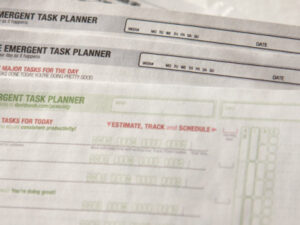(last edited on April 4, 2015 at 3:28 pm)
Yesterday I was reviewing my to-do lists, and was surprised at how reluctant I was feeling about the whole process. Every item that I reviewed was accompanied by a negative reaction like, “man, that will be a pain in the ass” and “ugh, that is going to be a problem.” These feelings were not vocalized in any detail, though, until I pressed the issue and demanded real reasons to accompany the feeling. The alternative was to not do anything at all.
It occurred to me that my underlying reaction was similar to that of a miser. My cheapskate attitude toward spending time was actively interfering with motivation to apply it wisely. I was being the Scrooge McDuck of time!
Hoarding TIme
I do like the feeling of having lots of time, which is the seeming pre-requisite for freedom of action. This is a falsehood, though; the feeling of having lots of time is more about the unspoiled possibility, like a fresh piece of paper or a dream that exists only in my head. The reality of bringing dreams to fruition requires that one actively spends time in pursuit of it. However, the reality of spending time is often messy and frustrating. It’s a lot easier to just sit on it and enjoy the feeling of being time-wealthy, even though it expires through non-use like a bad cell phone plan.
I’m a time hoarder, apparently. My aversion to non-optimal experience is such that I would rather fritter my time away on harmless distractions that don’t add much value to my day; in my primitive slug brain, the treat that pains me less is preferred to the possibility of something frustrating. It has gotten to the point where even allocation of time becomes an activity fraught with negativity; my assumption is that most chores and difficult tasks are going to be frustrating or confining, and my subconscious generates the negative anticipation. This might be one reason why I don’t like playing board games; the idea of being trapped in a game for two hours, however enjoyable the company, is enough for me to not even want to play.
Counteracting the Hoarding Instinct
My attitude toward spending time is irrational, but understandable. Having identified it, I think the counter action might be something like this:
- Recognize that every experience that I spend time on is not going to be “optimal”, and this is not necessarily wasteful. It’s merely a necessary part of the experience. Time applied to a challenge, however frustrating, is time well-spent because this is the only way that anything will get done. As Churchill said: “When going through hell, keep going.”
- Disempower the negative thought by calling its bluff. “What’s the downside? Is it just that I’m uncertain or impatient?” If that’s the case, the solution is to start whittling down that uncertainty by tackling a very limited-scope task.
- Adopt a general attitude of spending time freely in small increments. If I find myself looking at a 40-hour project, this is daunting. Spending 5 minutes on it is much less daunting, and the benefit from doing 5 minutes of REAL WORK is often apparent enough that spending more time seems suddenly worthwhile.
- Look at my time budget and realize just how much time I have. In a week, I have about 8 hours available per weekday for a total of 40 hours. On top of that, I have another 40 hours available for household-related stuff. The weekends offer another buffer of 32 hours. By this reasoning, I have 112 waking hours every week to tackle my various todo lists, through realistically I’d cap it at 40 hours of project work. Still, that’s a lot of time, considering how muh one can do in just 15 minutes to get the ball rolling.
- Measure how long things take. I’m always surprised at how little time it takes to do tasks that I’ve been putting off. Just the other day I was procrastinating on rolling up a burst garden hose, and after three days I finally got up to do it by estimating that it would take less than 5 minutes to take care of the mess and replace it. It took 4 minutes. Sheesh. Not all tasks are so simple, but getting started on them often takes a lot less time than one would think. Keeping a time log of this is a good way of seeing how those tasks break down.
With these realizations, I have some mental tools to help me combat my tendency to hoard time, which keeps me in the moment of illusionary total possibility. Nothing happens in that state, ever, until I blow a chunk of time messing around.
On a side note, I’m using Wunderlist to keep track of my long-term project list, and am evaluating Trello as a possible replacement/supplement. I’m using these tools to keep track of my “Task Cloud of Possibilities”, and my personal productivity is measured by how many of those tasks get actual time spent doing them, and how many are closed at the end of each day.
UPDATE: Here are some followup thoughts on how this insight about being a time miser has led to an unexpected gain in positive attitude.




6 Comments
Hey Dave,
I definitely share this attitude towards work as well. But it’s usually only for my personal projects and tasks, not my stuff for my job. I’m thinking this is because I know I HAVE to do the job stuff, and not necessarily the personal stuff all the time (especially if it’s more than admin type stuff).
Coming from a background in Economics, where you are taught about opportunity cost and calculate the optimal post of everything, I tend to over think what I should be working on, leading to procrastination.
For instance, here I am writing a comment on your post. I first had the idea that I might want to link to it, pulling out quotes, and commenting that way. Instead I chose to comment. But often times I’ll just not do either!
One last thing that I have trouble with is trusting my to-do list. I look at it and it feels foreign at times. I know I wrote it, but it sometimes feels like someone else did, which puts me off greatly. Have you ever had this feeling?
Hey Cameron,
The distinction between job tasks and personal tasks affects me the same way. It’s a lot harder to do something when no one is telling you to do it. I think that there are a couple of subconscious expectations that contribute to this:
Work Project = Obligation. Personal Project = Fun. Arduous work projects are done because we are obligated to. I think we expect personal projects to not be that way, but the rewarding ones require just as much work if not more.
Learning Curve The kind of projects I tend to want to do are ones that have a learning curve, and as an adult I have forgotten what a pain in the ass that is. It’s not fun, as Kathy Sierra might say, until we reach a certain level of awesomeness. It’s even worse when you’re learning in isolation.
For myself, I’ve been having to train myself to relish and embrace the arduous nature of personal project work. I still kinda suck at it, but I’ve evolved methods of coping. One of them is just writing about them all on my various blogs, letting people know what I’m doing and recogizing that there might be others in the same place. For whatever reason, that works for me.
That’s an interesting observation about your to-do list. I don’t have the same reaction toward my todo lists; my concern is that I’m going to forget something or not look at them enough, but in recent years I’ve started thinking of them as hardy fruit trees that may one day bear fruit. I like trees, so this is a positive image for me to hold. Not TRUSTING your to-do list, though, is really fascinating. That it feels foreign is even more interesting.
If I think about the conditions under which I might not trust my own to-do list, I can imagine the following:
You mentioned the idea of opportunity cost and other such metrics from Economics. I might be completely off-base on this, but Economics tends to focus on analysis of past trends and root causes to understand what has happened. However, it’s not particularly good at predicting what WILL happen with any degree of certainty. Please correct me if my layman’s understanding is missing some point…I’d love to spend a day with an economist and pick their brain about how the world works!
Measuring opportunity cost of the future seems difficult. You can get a good accounting of it after you have spent the resources and measured the yield of the endeavor with great certainty. But only afterwards. I used to have the same problem with a lot of things (still do, actually), except I framed the issue as wanting to “optimize my time and application of energy”. This is possible, though, only if the process is known already. If you’re making up something NEW, and are in learning mode, optimization is impossible until you’ve done the first pass.
Your first two points on work vs. personal tasks and the learning curve hit the nail on the head for me, big time.
The missing piece to the puzzle for me is that when I get home after a long day of work, I don’t have the energy to put into my personal projects, even if I am prepared mentally (knowing it’s hard) to do the work..
I’m not sure how to get around this problem. I’m thinking having a really inviting work space is a piece of the puzzle. Right now I don’t have a great work place, which initially turns me off from doing any of the tasks on my list.
What I meant when I referred to opportunity costs is it’s a principle I use, probably too much when deciding which any one action to do at a given time. What this leads to is paralysis by analysis because I can’t figure out which task is most optimal to do.
This is good to do only if you know the process like you said in your last paragraph. But I get in a bad habit of trying to compare two tasks for one of which I’m not sure what the process looks like.
This is a fun discussion by the way :)
David,
The bad things about your slug-brain (by which I assume you mean the R complex?) are that: 1. It is very simple: it can only grab what it wants or run away from what it fears 2. All your schemes and dreams have to get through it to get out into the rest of your body and the real world.
The good thing about it is that it is very simple: you can lie to it. “I’m going to work on Big, Scary, Vital Project X” will have it running for cover whereas “I’ll just get out the project file” is non threatening. You know that you’re going to go on and hash out some ideas, but there’s no need to tell it.
Cameron,
I know what you mean about the to do list. I feel that way about mine when I’m not getting through it. One approach is to declare a backlog, and write a new list (with “work through the backlog”) as one task. And do what it takes to keep the new list short.
dear David, do you agree that Economists are misers or they are not? thanks.